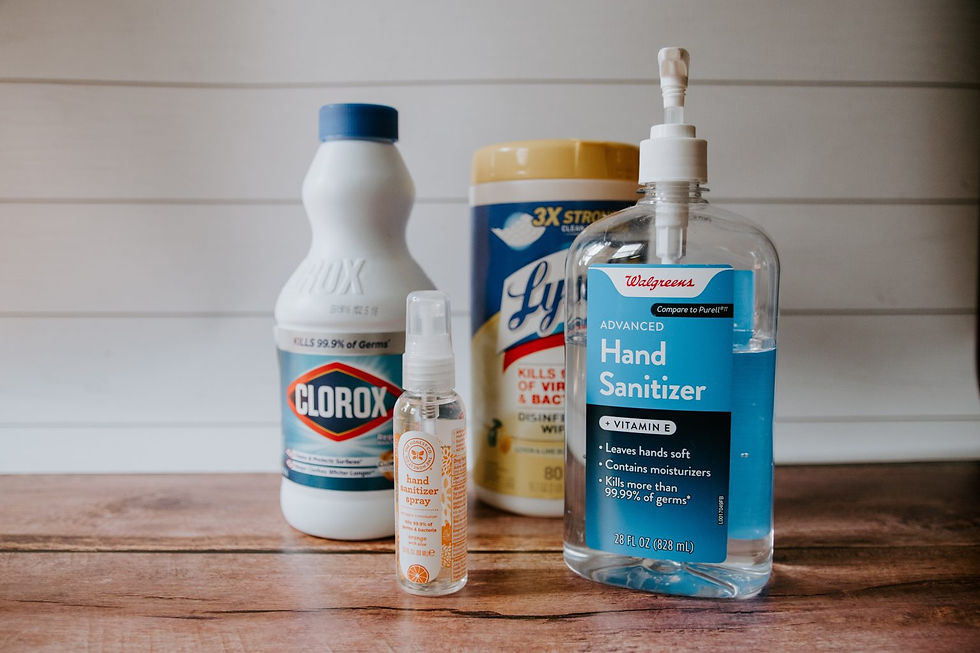The Proven Dangers of Over-Sanitizing
- Sam Jump

- Oct 9, 2020
- 4 min read
Updated: Oct 11, 2020
Understanding the proven risks of excess exposure to antiseptic products

With the world-wide increase in fear this year has come the increased over-use of hand sanitizer, antibacterial soaps, and chemical-laden aerosol sanitizing sprays. Not to mention, though I will, the rise in sales and stock of a company we all know...Lysol.
In a time where contorted, unclear, and ever-changing information around COVID-19 has now been steering the focus of most human lives for nearly 8 months, there's been a lot of extra and regular exposure to manufactured antiseptic chemicals.
We've all seen the empty shelves, still a sight in some stores, as people do what they know and what they're told in an attempt to try and protect themselves from the spotlighted virus (and the other everyday germs they've also largely been taught are "bad").
What's not being included in the inundation of information we're being craft-fully fed is the effects of that prolonged and habitual exposure. So I'll help fill in that "overlooked" gap here today.
Skin irritation and toxicity
Might I remind you that skin is the human body's largest organ. Too much exposure to the active ingredients in the hand sanitizers so many have come to depend on to keep them "safe", typically very contents such as alcohol and triclosan, irritate the skin.
Dr. Anas Siddiqui of McLaren Flint said the medical community itself has not been immune to side effects from increased use of hand sanitizer amid COVID. She stated that, "A lot of my colleagues, they started developing itching, rashes on their skin. Just because of irritation through excess exposure, because alcohol is a very toxic compound that's easily absorbed through the skin.”
The FDA (who, I will be the first to admit is not the most responsible or reliable when it comes to label regulation...but lots of people trust them) regulations for hand sanitizers consider them over-the-counter topical drugs, which require warning labels.
Much of the hand sanitizer sold in the US also includes methanol, another harmful ingredient, also according to the FDA. Both alcohol and methanol are considered toxic when ingested or absorbed through the skin.
"Increased contact with these irritants have been shown to increase the risk of hand dermatitis or eczema. This commonly manifests on the skin with redness, dryness, cracks, and even blisters that cause itch or pain." -Caroline Nelson, M.D. (a Yale Medicine dermatologist and instructor at Yale School of Medicine)
The FDA is currently reviewing the active ingredients in hand sanitizers, but reported that there is currently no evidence that the products are any more effective than washing hands with water and regular soap for 20 seconds (as recommended by the CDC).
Increased resistance to antibiotics
Also according to the CDC themselves, hand sanitizer with antibacterial ingredients contribute to the development of antibiotic-resistance.
"What does that mean?" Why, it means that your body's natural ability to defend itself from foreign organisms that enter the body is compromised; that because the body starts depending on a false defense system (created by the antiseptic), it's made to think it doesn't need to do its main job, which is to protect our system from "intruders."
Antibiotic-resistant also means that your body grows the ability to tolerate drugs that are intended to combat and neutralize foreign bodies presented when you're sick. Therefore, doctors may need to prescribe stronger drugs to treat symptoms that previously could've been handled by your body, itself, or a less intense option.
In a nutshell, overuse of antiseptics, including hand sanitizers and disinfectant wipes, means that your body will need even stronger drugs to treat symptoms of illness when you do get sick.
...which is actually more likely to happen with antiseptic over-use, especially those that include triclosan, which is known to weaken human immune function, making people more susceptible to allergies and illness.
Sanitizer fumes, alone, pose their own dangers
Because of the potency of alcohol compounds found in antiseptics, reports of headaches and migraines have increased due to regular and long-term exposure through over-use.
Alcohol is also known to seriously irritate nucleus membranes inside the nose, leading to allergy-like symptoms such as a runny nose, sore throat and sinus pain. Those with pre-existing asthma put their respiratory health in even greater danger; and even those who don't already deal with asthma symptoms are finding themselves with difficulty breathing due to increased exposure.
Nausea and vomiting are other verified symptoms of excessive exposure to sanitizer fumes. Especially with long-term use, the fumes alone have even been known to cause problems with the digestive tract, leading to weakening of the stomach lining. Oof.
Work with chemicals and using sanitizers? Please think again.
Sure, you work with chemicals throughout your day, and you want to ensure that you leave with clean hands at the end of your shift. But if you work with strong cleaning, de-greasing agents, pesticides and the likes, hand sanitizer is the last thing you should add to the mix.
The combination of chemicals can not only be really harmful for your external body, but according to a study published in the Journal of Occupational and Environmental Medicine, farmworkers who use hand sanitizer had increased levels of pesticides in their bodies as opposed to those who didn't use the sanitizer.
That means that the skin's own defense system and permeability is compromised with added use of sanitizers. Which is something we should all consider, based on even the most basic understanding of the environmental chemicals we're all exposed to on a regular basis these days.
Makes you wonder why products and ingredients that even the FDA was working to ban only a few years ago are now allowed to be in such profound demand, huh? It sure peaks my curiosity.
Stick to the soap and water, y'all.
By Sam Jump
























Comments